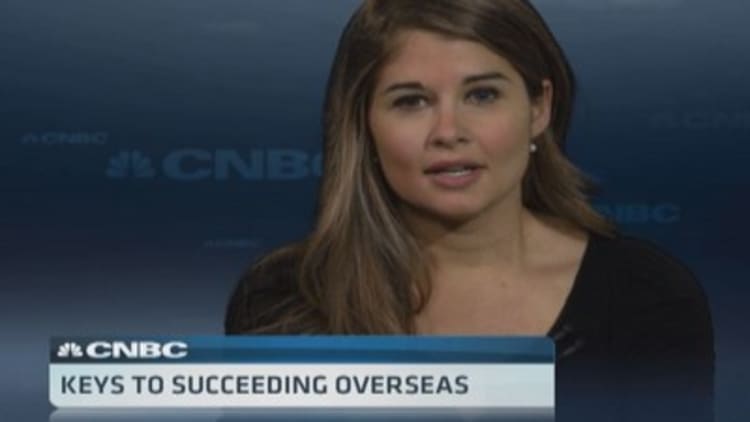
For some retailers, the grass is greener on the other side—of the pond, that is.
Emaciated traffic and extreme price competition have left the industry in a slugfest just to achieve positive domestic same-store sales. As a result, many retailers have been looking to plant their flags overseas, scouring Europe and the emerging markets in search of growth.
While the strategy has proven successful for some U.S. firms going abroad—as well as international companies gaining entry in the United States—some within the industry say the globalization of retail has brought with it a new challenge.
In their view, it's taken the excitement out of the international shopping experience.
"The world is getting smaller through online and omnichannel and YouTube and everything else," said Alison Paul, vice chairman and U.S. retail and distribution leader at Deloitte. "You can walk into a lot of stores in a lot of major capitals of the world and if you didn't look at the language on the labels of things, you might think you were anywhere in the world."
(Read more: 7 ways designers are battling cheap knockoffs)
Retailers from Target to J. Crew are testing the waters abroad, while luxury brands including Donna Karan and Ralph Lauren have long maintained a presence in Europe and beyond.
Tommy Hilfiger, whose products are sold in more than 90 countries, said at last month's Financo CEO Forum that while he's glad to be part of the globalization of fashion, one repercussion is that "it no longer is exciting or unique" to shop abroad. That's because consumers are met with the same brands in Rio de Janeiro or Dublin as they are in Munich or New York.
"It's difficult to find new ideas in this day and age because on every street corner in every major city you find the same brands," Hilfiger said.
To avoid boring customers in today's interconnected world, retailers need to ensure they differentiate themselves, Paul said. For Hilfiger, this means acting locally and think globally.
(Read more: Retail's biggest problem may have been solved)
"Our assortments in Germany are totally different than they are in Spain or in the Netherlands or in other parts of the world," he said. "It's really important that you listen to the consumer in these various regions and mold and shape the product for them."
Andrew Rosen, CEO of luxury brand Theory, which conducts more than 50 percent of its sales internationally, agreed that it's important for brands to adapt to local cultures. He said it's exciting for consumers to experience a brand they're comfortable with, but with a different country's cultural flavor.
International isn't always the answer
It's not only the risk of boring shoppers that challenges retailers looking overseas. According to a Deloitte survey, which analyzed 87 American-based specialty retailers over a 10-year period, shareholder returns were 20 percent higher for retailers who stayed focused on the domestic market versus those who expanded abroad.
One common reason behind a retailer's struggles was that it failed to adapt to local consumers' tastes. Deloitte called attention to one luxury retailer that entered Europe, choosing to sell the same handbags that had been successful in the U.S. What the company didn't realize was that European women lead a more pedestrian lifestyle, and therefore prefer smaller purses.
"Frequently, retailers believe their brand will resonate in all markets in the same fashion and thus fail to adapt to unique needs and preferences," Deloitte wrote in its report. "Retailers should recognize local market preferences and evaluate how to adjust messaging or product offering to that customer base, without compromising the integrity of the brand."
(Read more: A 'tsunami' of store closings seen hitting retail)
Typically, investors react with hesitancy to retailers' decisions to go global. That's because the complexity and resources needed may outweigh the benefits, Deloitte said.
The firm also found that investors fear that retailers who look abroad for solutions will lose sight of their core, domestic business. This could cause the evolving tastes of the domestic customer to be overlooked.
Globalization goes both ways
Although global expansion offers opportunities to U.S. retailers, they aren't the only ones looking to outside markets for growth. Wells Fargo analyst Paul Lejuez said in a recent note that overseas competitors have already started to pressure a crowded domestic market, calling attention to H&M, Inditex's Zara and Fast Retailing's Uniqlo.
He also noted smaller entrants into the U.S. market, including Joe Fresh and Jack Wills, which he said seem to be gaining traction. The competition adds another layer of intensity when factoring in e-commerce.
"It's not to say that international players are taking over the U.S. market, but in certain sectors of retail where companies are already battling for limited traffic, these newer entrants are disrupting a retail landscape that is already overstored and hyper-competitive," Lejuez wrote.
And as retailers from Abercrombie & Fitch to J.C. Penney will likely be in store-closing mode for the next few years, international retailers will have plenty of room to grow.
"Mall developers will be looking for new, traffic driving concepts," Lejuez wrote.
—By CNBC's Krystina Gustafson. Follow her on Twitter @KrystinaGustafs.


